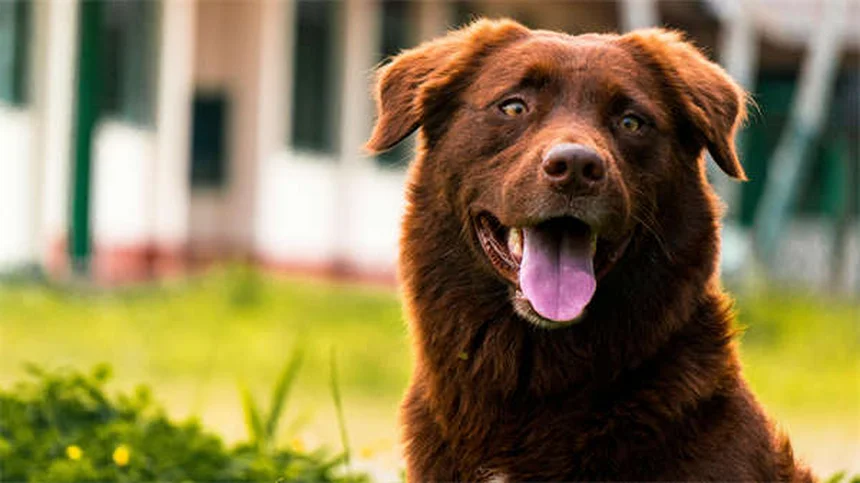What health problems do senior dogs face? The answer is: aging dogs commonly develop vision loss, urinary issues, dental disease, skin problems, weight changes, mobility issues, and cognitive decline. As your furry friend enters their golden years (typically 7-10 years old), you'll likely notice some changes in their health and behavior. Here's the good news - while we can't stop the aging process, there's plenty we can do to keep our senior pups comfortable and happy! I've worked with countless older dogs and their owners, and I can tell you that early detection makes all the difference. Let's break down what to watch for and how you can be your dog's best health advocate during this special life stage.
E.g. :West Nile Virus in Horses: Symptoms, Treatment & Prevention Tips
- 1、Spotting Health Issues in Your Senior Dog
- 2、Eyes: The Windows to Your Dog's Health
- 3、Bathroom Habits: More Than Just a Nuisance
- 4、Dental Health: More Than Just Bad Breath
- 5、Skin and Coat Changes: Not Just Cosmetic
- 6、Weight Changes: Finding the Balance
- 7、Mobility Issues: Keeping Them Moving
- 8、Behavior Changes: More Than Just "Getting Old"
- 9、Final Thoughts on Senior Dog Care
- 10、Nutritional Needs of Senior Dogs
- 11、Mental Stimulation for Aging Canines
- 12、The Importance of Routine Veterinary Care
- 13、Creating a Senior-Friendly Home Environment
- 14、Quality of Life Considerations
- 15、Financial Planning for Senior Dog Care
- 16、FAQs
Spotting Health Issues in Your Senior Dog
Hey there fellow dog lovers! Let's talk about our aging furry friends. When dogs hit that senior stage (usually around 7-10 years old), we need to keep our eyes peeled for some common health changes. I can't stress this enough - regular vet checkups are crucial! Most vets recommend twice-yearly wellness exams for older pups.
Why Senior Dogs Need Extra Care
You know how we humans get a few more aches and pains as we age? Well, dogs are no different! Their bodies start changing, and we need to be their health detectives. Remember, catching problems early makes all the difference in keeping our old buddies happy and comfortable.
Think about it - would you ignore your grandpa's health concerns? Of course not! Our senior dogs deserve the same attention. Let's dive into what to watch for.
Eyes: The Windows to Your Dog's Health
Signs of Vision Trouble
Notice your dog acting more cautious lately? Maybe they're bumping into furniture or hesitant to go outside at night. These could be signs of vision problems. Other red flags include:
- Cloudy eyes
- Redness or irritation
- Squinting or rubbing their face
Here's an interesting fact: many dogs develop a harmless condition called lenticular sclerosis that makes their lenses look cloudy. This usually doesn't affect their vision much, but it's always best to get it checked.
 Photos provided by pixabay
Photos provided by pixabay
When to Worry About Eye Issues
Some eye problems are serious business. Conditions like cataracts, dry eye, or corneal damage need veterinary attention. The good news? Many are treatable! Cataracts can often be surgically removed, just like in humans.
Pro tip: If your dog does lose vision, they can adapt amazingly well. Ask your vet about making your home more navigation-friendly for a blind dog.
Bathroom Habits: More Than Just a Nuisance
What Changes to Watch For
Is your senior dog suddenly having accidents or straining to pee? This isn't just inconvenient - it could signal:
| Symptom | Possible Cause |
|---|---|
| Frequent urination | Kidney disease or diabetes |
| Straining to urinate | UTI or bladder stones |
| Accidents in house | Arthritis or cognitive decline |
Did you know that middle-aged to older dogs are especially prone to urinary issues? That's why any change in bathroom habits deserves a vet visit.
Treatment Options
The solution depends on the cause. Your vet might recommend:
- Special prescription diets
- Medications
- Increased water intake
- In some cases, surgery
Remember that joke about dogs drinking from the toilet? Well, making sure they have plenty of fresh water is no laughing matter for senior pups!
Dental Health: More Than Just Bad Breath
 Photos provided by pixabay
Photos provided by pixabay
When to Worry About Eye Issues
Here's a wake-up call: 85% of dogs over age 3 have some form of dental disease. That stinky dog breath? It's often the first sign of trouble. Other symptoms include:
- Red, swollen gums
- Drooling
- Loose or missing teeth
- Difficulty eating
Ever had a toothache? Imagine how your dog feels with dental pain! The good news is it's never too late to start proper dental care.
Fighting the Plaque Battle
Here's my three-step plan for better doggy dental health:
- Schedule a professional cleaning (yes, dogs need these too!)
- Brush their teeth daily with pet-safe toothpaste
- Use dental chews and toys to help between brushings
Fun fact: Some dogs actually enjoy having their teeth brushed once they get used to it. Try chicken-flavored toothpaste - it's a game changer!
Skin and Coat Changes: Not Just Cosmetic
Common Skin Issues in Older Dogs
As dogs age, their skin becomes thinner and less elastic. You might notice:
- Dry, flaky skin
- Unusual lumps or bumps
- Hair loss or thinning
- Rashes or irritation
Here's a reassuring thought: most lumps are harmless fatty tumors called lipomas. But since some lumps can be serious, it's always best to get them checked.
 Photos provided by pixabay
Photos provided by pixabay
When to Worry About Eye Issues
Not all skin changes are equal. Be especially concerned if you notice:
- Rapidly growing lumps
- Changes in color or texture
- Bleeding or oozing
- Pain when touched
Did you know your vet can often tell a lot about a lump just by feeling it? Though sometimes they'll recommend a needle biopsy for certainty.
Weight Changes: Finding the Balance
The Skinny on Weight Issues
Some senior dogs struggle to keep weight on, while others pack on the pounds too easily. Both scenarios can cause health problems. Here's why weight matters:
Overweight dogs face higher risks of:- Arthritis- Heart disease- Diabetes- Breathing problems
Underweight dogs may have:- Poor immune function- Muscle loss- Difficulty staying warm
Finding the Right Diet
Ever tried those senior citizen meal plans? Dogs need age-appropriate nutrition too! Work with your vet to:
- Choose the right senior formula
- Adjust portion sizes
- Add supplements if needed
Here's a tip: Many pet food companies make senior-specific formulas with adjusted protein, fat, and fiber levels. Your vet can recommend the best option.
Mobility Issues: Keeping Them Moving
Signs of Joint Problems
Notice your dog hesitating before jumping on the couch? Or taking longer to get up in the morning? These could be signs of arthritis or other joint issues.
Other red flags include:- Stiffness after resting- Limping or favoring a leg- Difficulty with stairs- Reluctance to play
Helping Your Aching Pup
There's so much we can do to help! Consider:
- Joint supplements (glucosamine works wonders!)
- Orthopedic dog beds
- Ramps or steps for furniture
- Prescription pain meds if needed
Did you know physical therapy isn't just for humans? Many veterinary rehab centers offer amazing treatments like hydrotherapy for arthritic dogs.
Behavior Changes: More Than Just "Getting Old"
Recognizing Cognitive Decline
Is your dog suddenly forgetting commands they've known for years? Pacing at night or getting "lost" in familiar places? These could be signs of canine cognitive dysfunction (doggy dementia).
Other symptoms include:- Changes in sleep patterns- Increased anxiety- Loss of house training- Decreased interest in play
Supporting Your Aging Companion
While we can't stop aging, we can help our dogs cope better:
- Maintain a consistent routine
- Provide mental stimulation
- Consider special diets or supplements
- Ask your vet about medications that can help
Here's a heartwarming thought: Even with cognitive changes, your dog still knows and loves you. They just need extra patience and understanding.
Final Thoughts on Senior Dog Care
Caring for an older dog is both challenging and incredibly rewarding. By staying alert to these common issues and working closely with your vet, you can help your furry friend enjoy their golden years to the fullest.
Remember - every extra day with our senior dogs is a gift. With proper care and attention, we can make those days as comfortable and joyful as possible.
Nutritional Needs of Senior Dogs
The Changing Dietary Requirements
You wouldn't feed a toddler the same meal as a teenager, right? Well, senior dogs have different nutritional needs too! As dogs age, their metabolism slows down by about 20-30%, meaning they need fewer calories but more of certain nutrients.
Here's something interesting - did you know that older dogs often need more protein than younger adults? That's because they lose muscle mass as they age. But it's got to be high-quality, easily digestible protein. Chicken, fish, and eggs are great options!
Special Diets for Specific Conditions
When your vet recommends a special diet, it's not just marketing hype. Prescription foods can make a real difference for conditions like:
- Kidney disease (lower phosphorus)
- Heart problems (controlled sodium)
- Joint issues (added omega-3s)
I once had a client whose 12-year-old Labrador improved dramatically after switching to a kidney-friendly diet. The difference was like night and day!
Mental Stimulation for Aging Canines
Keeping Those Neurons Firing
Ever heard the phrase "use it or lose it"? That applies to your dog's brain too! Cognitive decline isn't inevitable - we can help keep their minds sharp with simple activities:
- Food puzzle toys (my personal favorite is the Kong Wobbler)
- Short training sessions with new commands
- Nose work games (hide treats around the house)
Here's a fun fact: Dogs who regularly engage in mental exercises maintain better cognitive function into old age. It's like doing crossword puzzles for pups!
Adapting Activities for Physical Limitations
What if your dog can't physically do what they used to? No problem! We can modify activities:
| Old Activity | Senior-Friendly Version |
|---|---|
| Fetch | Rolling balls short distances |
| Long walks | Multiple short strolls |
| Dog park visits | Quiet playdates with calm dogs |
Remember, the goal isn't to recreate their puppy years, but to provide appropriate stimulation they can enjoy safely.
The Importance of Routine Veterinary Care
Beyond the Annual Checkup
You might wonder, "Why does my senior dog need vet visits so often?" Here's the deal - older dogs can develop health issues five times faster than younger ones. Those twice-yearly checkups allow us to catch problems before they become serious.
Think of it like car maintenance - you wouldn't wait until your engine fails to change the oil, right? Regular blood work, urine tests, and physical exams are our early warning system.
Common Senior Dog Tests and What They Reveal
Here's what your vet might recommend and why:
- Blood chemistry panel - Checks liver, kidneys, and blood sugar
- Urinalysis - Detects infections or kidney issues
- Thyroid test - Common in older dogs (hypothyroidism affects about 25% of seniors)
I always tell clients - these tests aren't just looking for problems, they're confirming your dog is as healthy as they seem!
Creating a Senior-Friendly Home Environment
Home Modifications for Comfort and Safety
Would you make an elderly relative climb stairs to get to the bathroom? Probably not! Our senior dogs deserve the same consideration. Simple changes can make a huge difference:
- Non-slip rugs on hardwood floors
- Raised food and water bowls (easier on arthritic necks)
- Baby gates to block staircases
Here's a pro tip: If your dog struggles with slippery floors, try putting down yoga mats as temporary pathways. They're cheap and provide great traction!
The Comfort Factor
Let's talk about beds - not all are created equal for senior pups. Look for:
- Orthopedic memory foam (supports achy joints)
- Low-entry designs (easier to step into)
- Washable covers (because accidents happen)
Did you know some beds even come with heating elements? Perfect for dogs with arthritis on chilly mornings!
Quality of Life Considerations
Recognizing Good Days vs. Bad Days
How can you tell if your senior dog is still enjoying life? Here's my simple checklist:
- Do they still greet you with enthusiasm?
- Are they eating with appetite?
- Can they move around without constant pain?
I always remind owners - one bad day doesn't mean it's time to make tough decisions. We look at patterns over weeks, not single moments.
Making Every Moment Count
What's the point of keeping our dogs alive if they're not enjoying life? That's the million-dollar question. The answer lies in focusing on quality, not just quantity.
Simple pleasures make all the difference:- Gentle belly rubs- Favorite treats (even if it's just licking peanut butter off a spoon)- Quiet time together in their favorite spot
Here's the beautiful truth - sometimes the smallest moments create the biggest memories in our senior dogs' golden years.
Financial Planning for Senior Dog Care
Budgeting for the Golden Years
Let's be real - senior dog care can get expensive. But with some planning, you can manage costs without sacrificing quality care. Consider:
- Pet insurance (though premiums increase with age)
- Setting aside a monthly "senior dog fund"
- Asking about payment plans at your vet clinic
Here's a sobering fact: The average annual vet cost for a senior dog is $800-$1,500, compared to $400-$600 for younger adults. But isn't our furry family worth it?
Prioritizing Care Expenses
When funds are tight, how do you decide what's most important? Here's my suggested priority list:
- Pain management (no dog should live in constant pain)
- Essential medications
- Diagnostic tests to monitor conditions
- Comfort items (like special beds)
Remember - many vets understand financial constraints and will work with you to provide the most critical care first.
E.g. :7 Health Issues to Look for When You Have an Older Dog | PetMD
FAQs
Q: How often should I take my senior dog to the vet?
A: Most veterinarians recommend twice-yearly checkups for senior dogs, even if they seem healthy. Here's why: dogs age much faster than humans (about 7 years for every human year!), so waiting a full year between visits means we might miss early signs of developing conditions. During these wellness exams, your vet will typically check your dog's weight, listen to their heart and lungs, examine their eyes/ears/mouth, and may recommend blood work or other tests. I always tell my clients - these visits are like getting your car's regular maintenance; they help catch small issues before they become big (and expensive) problems!
Q: What are the first signs of dog dementia?
A: Canine cognitive dysfunction (doggy dementia) often starts with subtle changes you might initially chalk up to "just getting old." Watch for these early warning signs: your dog seems confused in familiar places, gets "stuck" in corners, paces at night when they used to sleep, forgets commands they've known for years, or has accidents in the house despite being house-trained. Some dogs also show increased anxiety or changes in their interactions with family members. If you notice these behaviors, don't panic - but do schedule a vet visit. There are special diets, supplements, and even medications that can help slow the progression and improve your dog's quality of life.
Q: Are lumps on older dogs always cancerous?
A: Not all lumps are created equal! While discovering a new bump on your senior dog can be scary, the majority of lumps we see in older dogs are benign fatty tumors called lipomas. These soft, movable masses under the skin are generally harmless unless they grow very large or interfere with movement. However, some lumps can be malignant, so it's always smart to have any new growth checked by your vet. We look for warning signs like rapid growth, irregular shape, fixation to underlying tissue, or changes in color/texture. Your vet might recommend a fine needle aspirate (a simple needle test) to determine what type of lump it is. Remember - early detection is key for the best outcomes!
Q: Why is my senior dog drinking and peeing so much?
A: Increased thirst and urination in older dogs often signals an underlying health issue that needs attention. Common causes include kidney disease, diabetes mellitus, Cushing's disease, or urinary tract infections. Here's what happens: these conditions affect how your dog's body processes fluids, leading to excessive drinking and subsequent urination. For example, with kidney disease, the kidneys can't concentrate urine effectively, so your dog produces more dilute urine and drinks more to compensate. Don't ignore these symptoms - schedule a vet visit that includes blood work and a urinalysis. The sooner we identify the cause, the better we can manage the condition and keep your pup comfortable.
Q: Can arthritis in dogs be cured?
A: While we can't cure arthritis (the progressive degeneration of joints), we have many effective ways to manage it and keep your senior dog mobile and comfortable. Treatment typically involves a multi-pronged approach: joint supplements (like glucosamine and omega-3s), weight management, controlled exercise, pain medications when needed, and home modifications (like ramps or orthopedic beds). Many of my clients see dramatic improvements with physical therapy - options like hydrotherapy (water treadmill) are especially great for arthritic dogs because they exercise without joint stress. The key is starting treatment early and being consistent. With proper care, most dogs with arthritis continue to enjoy good quality of life for years!



Discuss